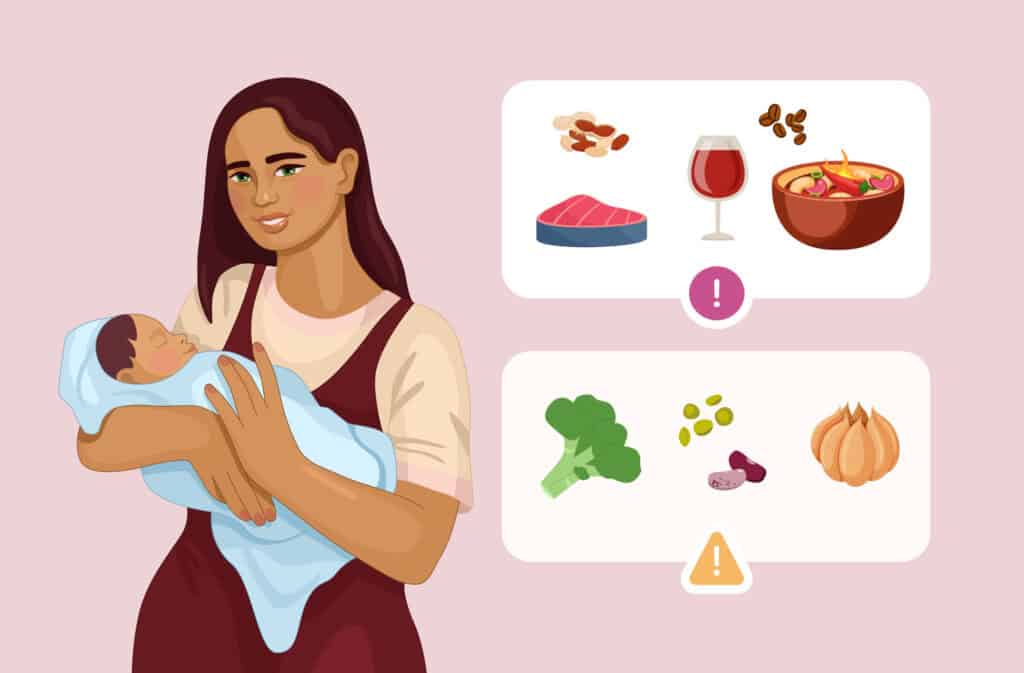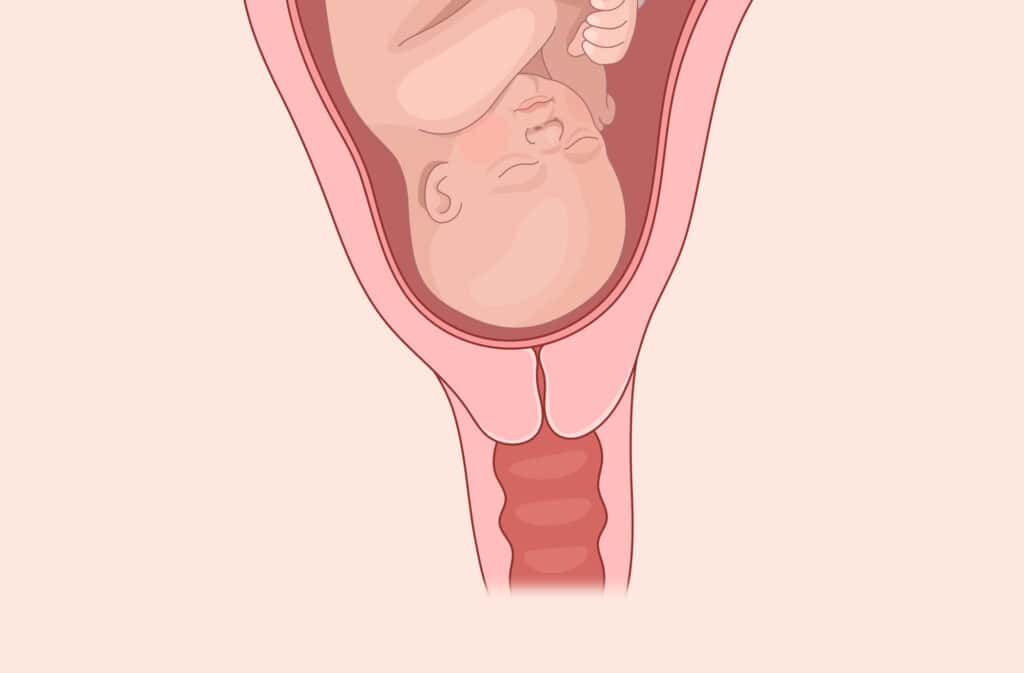Femia > Health Library > Being a mom > Raising a baby > 10 foods to avoid while breastfeeding: What to skip for a healthy baby and milk supply
10 foods to avoid while breastfeeding: What to skip for a healthy baby and milk supply

- Updated Feb 11, 2025
- Published
CRAFTED BY HUMAN
Crafted by human At Femia, we provide accurate and up-to-date information at every stage of your journey, from trying to conceive, pregnancy and postnatal support. All content is created by a real person based on in-depth research and own professional experience. Femia ensures that you will receive expert advice, strict accuracy and a personalized approach from our authors/medical experts. Learn more about our editorial policy.
FACT CHECKED
Fact checked At Femia Health, we maintain the highest standards of editorial excellence in delivering content focused on helping you conceive, guiding you through pregnancy, and supporting you postpartum. Explore our content review principles to learn how we ensure the accuracy and quality of our health and lifestyle tips for every stage of your journey.
Most foods are completely safe to eat while breastfeeding, and your baby benefits from the variety in your diet. Still, certain dietary choices may cause issues in some babies.
Food to avoid while breastfeeding may include high-mercury fish, caffeine, alcohol, spicy foods, and potential allergens, like dairy or peanuts. Gas-producing foods such as broccoli and beans, along with foods that alter milk flavor, like garlic, may also cause fussiness in some babies. Stay mindful of your diet if you notice any unusual reactions, such as gassiness, fussiness, or skin rashes.
Did you know that what you eat can play a big role in your milk supply and your baby’s comfort? While most dietary choices are safe and even beneficial, there are some foods to stay away from while breastfeeding. These include foods that might make your little one a bit fussy or affect your own energy levels.
In this article, we’ll explore which foods to enjoy, which to approach with caution, and how to spot potential triggers in your baby’s reactions. Plus, we’ll debunk some common myths, answer your top questions, and share tips for creating a balanced, nutrient-rich diet that keeps both you and your baby happy and healthy.
Femia helps you understand your symptoms and when to take action
Why diet matters during breastfeeding
Your body is naturally designed to produce milk that will meet your baby’s nutritional demands. Still, the nutrients you consume can end up in your milk and become food for your baby, too. A recent study reveals that dietary habits can indeed impact the composition of breast milk.
The good news is that most foods are fine to eat while breastfeeding. If you had a healthy diet before or during pregnancy, you won’t need to make a huge adjustment postpartum. Also, all babies are unique. Which foods to stay away from while breastfeeding will depend on your baby’s individual sensitivity.
However, some foods are more likely than others to give your baby discomfort. For example, broccoli might cause gas or tummy ache, while peanuts might give your baby an allergic reaction. Consuming alcohol or certain seafood can disrupt the development of your baby in a more serious way.
👉Find out more: Newborn cues: Decoding your baby’s body language
10 foods to avoid while breastfeeding
You must be wondering: how should I change my diet? Here is a list of food to avoid while breastfeeding.
Caffeine
We know you haven’t been getting much sleep and very much look forward to your morning coffee. But, caffeine can pass into breast milk and affect your baby. Infants metabolize caffeine much slower than adults, so too much of it might make your baby irritable, restless, or disrupt their sleep patterns.
While you don’t have to give up caffeine completely, limit your caffeine intake to around 300 milligrams per day—roughly the amount in two cups of coffee or 4–5 cups of black tea— as recommended by health authorities. However, monitor your baby for signs of restlessness or irritability, as some infants may be more sensitive to caffeine. Remember that caffeine can also be found in tea, chocolate, and other foods.
Alcohol
Alcohol is another substance that gets into your bloodstream quickly, which means it may also pass into breast milk. Once ingested, it may affect your baby’s motor development, sleep, and feeding patterns. Still, you may not have to give it up completely.
When it comes to drinking and breastfeeding, balance and timing are key. It’s recommended to wait 2–3 hours after a standard drink (e.g., one glass of wine) before breastfeeding to allow your body to process the alcohol. Pumping and discarding milk won’t speed up this process, so plan your drinks carefully to keep your baby safe.
Spicy foods
You might be able to enjoy spicy foods without issue, but some babies have sensitive tummies. Spices like chili peppers or heavily seasoned meals can sometimes change the flavor of your breast milk and give your baby digestive problems and fussiness.
If your baby seems unsettled after you eat spicy food, consider reducing the amount or eliminating it temporarily to see if it helps.
Gas-producing foods
While certain cruciferous vegetables may cause gas in adults, there is no direct evidence they affect your baby through breast milk. Monitor your baby’s reactions and adjust your diet if necessary.
While not every baby will react to these foods, you might notice increased fussiness, gassiness, or discomfort in yours. If so, try cutting back on these vegetables and reintroducing them gradually to test your baby’s tolerance.
Mercury-rich fish
Fish is overall very healthy for breastfeeding mamas, but some types might cause problems. The issue is not in the fish itself but in the content of mercury. High-mercury fish, like swordfish, mackerel, and tilefish, should be avoided while breastfeeding.
Mercury can accumulate in breast milk and harm your baby’s developing nervous system. Instead, go for low-mercury seafood, like salmon, sardines, or shrimp. These are also rich in omega-3 fatty acids that will support your baby’s brain development.
Citrus fruits
Citrus fruits, like oranges, lemons, and grapefruits, are packed with vitamin C, which is good for your immune system. However, their acidity can sometimes upset your baby’s stomach.
If you notice your baby acting out, having a diaper rash, or being fussy after consuming citrus, this might be your sign. Opt for milder fruit options, like bananas or melons.
Allergens
Babies can have allergies, too—especially since their immune system is still developing. Common allergens, like dairy, peanuts, eggs, or soy, can occasionally cause reactions, especially if there’s a family history of allergies.
Watch out for symptoms like skin rashes, excessive crying, or digestive issues, like diarrhea or vomiting. If you suspect your baby is reacting to something in your diet, speak with a trusted healthcare professional before eliminating any major food groups.
Foods with artificial sweeteners
The effects of artificial sweeteners, such as aspartame, sucralose, or saccharin, in small babies are not well-studied. They may not be harmful in small amounts, but their long-term consequences are unknown.
Try substituting artificial sweeteners for honey or maple syrup (if your baby is over one year old). Artificial sweeteners can be found in anything from diet sodas to sugar-free candies.
High-sodium foods
The salt you consume may not directly affect the sodium levels in breast milk, but it can make you dehydrated and lower your milk supply.
Try your best to stay away from food choices that are excessively high in sodium, such as processed snacks, canned soups, and fast food. Go for fresh, minimally processed foods to keep your body hydrated and ready to produce milk.
Highly processed junk foods
Junk food that is highly processed is not just salty—it’s packed with empty calories, trans fats, and additives. Although these nutrients may not directly upset your baby, they are better left untouched.
In general, foods like chips, cookies, and sugary drinks don’t offer much nutrition for you or your baby. They may even leave you feeling sluggish. Go for baby-friendly, whole-food snacks, like nuts, fresh fruits, or yogurt, to keep your energy up and consume vital nutrients.
How to identify foods that upset your baby
Detecting foods to avoid while breastfeeding starts with paying close attention to your baby. It can feel like a guessing game at times, but a food diary can make the process much easier.
- Keep a food diary. Write down everything you eat, and note any changes in your baby’s behavior or physical symptoms to identify patterns. For example, if your baby becomes fussy or gassy after every feeding, look back at your recent meals to see if a particular food might be the culprit.
- Keep an eye on your baby’s symptoms. Take note of unusual fussiness, excessive crying, gassiness, bloating, diarrhea, or constipation. You can detect a food sensitivity or allergy through physical signs, like a rash, eczema, or hives.
- Stop eating problematic foods. If you notice consistent reactions, make note of the food to avoid while breastfeeding, and take it off your menu. Always reach out to your trusted healthcare professional before making major dietary changes, especially if you suspect a serious allergy or intolerance.
Femia helps you understand your symptoms and when to take action
A diet that supports milk production
As a general rule, staying hydrated and eating a balanced diet with plenty of fruits, vegetables, whole grains, and protein-rich foods will make your milk packed with essential nutrients. It can also help you feel energized and up to all the daily challenges.
Remember that producing breast milk is hard work, and you need more calories to meet your nutritional needs during this time. Aim for 340–400 more kilocalories (kcal) per day than the amount they consumed before pregnancy. In general, this would amount to 2,000 to 2,800 kcal per day.
👉Find out more: Signs of ovulation after giving birth: What new moms need to know
What to eat for optimal breastfeeding
Here are some good food choices while breastfeeding:
- Lean proteins. Foods like chicken, turkey, eggs, beans, and tofu provide essential amino acids to support your baby’s growth. Aim to include a protein source in every meal.
- Leafy greens. Spinach, kale, and other leafy greens are packed with vitamins A, C, and K, as well as folate and iron, which are crucial for your baby’s development. These vegetables are also a great source of antioxidants and help boost your overall nutrient intake.
- Whole grains. Oats, quinoa, brown rice, and whole-grain bread provide complex carbohydrates, which are a great energy source. They’re also rich in fiber, which supports healthy digestion for you and your baby.
- Calcium-rich foods. Milk, yogurt, cheese, and fortified plant-based alternatives help maintain strong bones and teeth for both you and your baby. Calcium is especially important for breastfeeding mothers, as it’s drawn from your stores to enrich your milk.
- Iron-rich foods. Include foods like lean red meat, lentils, and fortified cereals to replenish iron levels, which can be depleted during pregnancy and delivery. Iron helps prevent fatigue and supports your baby’s brain development.
- Omega-3 fatty acids. Fatty fish, like salmon, sardines, and mackerel, as well as flaxseeds and walnuts, are rich in omega-3s, which are crucial for your baby’s brain and eye development. Try to include two servings of low-mercury fish per week.
- Hydrating beverages. Staying hydrated is important for your body to keep producing enough milk. Water should be your primary choice, but herbal teas like chamomile or ginger are generally safe. Avoid sage and peppermint teas, as they may reduce milk supply. Aim for about 8–10 glasses of fluids per day.
Myths about foods to avoid while breastfeeding
There are a lot of myths about breastfeeding foods to avoid. Let’s debunk them together.
Myth: Garlic will spoil the taste of your breast milk.
Truth: While garlic can slightly change the flavor of breast milk, it doesn’t spoil it. In fact, some babies enjoy the slight flavor changes and may even feed longer when their mother eats garlic. Still, if your baby seems fussy after you eat garlic, reduce it temporarily to see if it helps.
Myth: Citrus fruits are completely off-limits.
Truth: Citrus fruits are rich in vitamin C and are generally safe to eat while breastfeeding. However, if your baby shows signs of discomfort, you might want to reduce your citrus intake to see if symptoms improve. If you have a citrus fruit sensitivity or allergy, skip it altogether.
Myth: Dairy should always be avoided.
Truth: Dairy is a common allergen, but unless your baby shows signs of dairy intolerance, such as colic, rashes, or digestive issues, there’s no need to cut it from your diet. Most mothers can safely consume dairy without any problems.
Myth: Eating beans or broccoli will always make your baby gassy.
Truth: While these foods can cause gas in some babies, not every infant reacts the same way. Unless you notice consistent discomfort in your baby after eating these foods, there’s no need to avoid them entirely.
Myth: You must follow a strict, bland diet while breastfeeding.
Truth: Most breastfeeding moms can enjoy a wide variety of foods without issue. Your baby benefits from the diversity in your diet, which can even help them develop a taste for different flavors later in life.
Questions from the Femia community
Can I eat sushi while breastfeeding?
Yes, you can enjoy sushi while breastfeeding, but it’s important to go for low-mercury fish, such as salmon or shrimp. Avoid sushi made with high-mercury fish, like tuna or swordfish, as mercury can pass into your breast milk. Moreover, sushi must be prepared and stored safely to minimize the risk of infection with microorganisms.
Are herbal teas safe while breastfeeding?
Most herbal teas are safe, but make sure to check the ingredients list. Teas made with herbs like chamomile, ginger, or rooibos are generally safe and soothing. Avoid teas with sage, peppermint, or parsley, however, as they may reduce milk supply. Always check with your trusted healthcare professional if you’re unsure about a specific tea.
Does dairy affect all breastfeeding babies?
No, dairy doesn’t affect all babies, but some may be sensitive to cow’s milk proteins in breast milk. You can recognize an allergic reaction by intense crying, gas, or skin rashes. If you suspect a reaction, try eliminating dairy from your diet for a couple of weeks to see if symptoms improve.
What if my baby is fussy after feeding?
If your baby is fussy after feeding, it could be due to something in your diet or an unrelated issue, like gas or colic. Keep a food diary to track what you eat and your baby’s reactions. If the fussiness is severe or lasts a long time, consult your healthcare provider to rule out allergies, sensitivities, or other concerns.
The bottom line
You should be able to eat most foods while lactating. However, some food choices can cause discomfort for your baby, and it’s important to recognize symptoms of a reaction, like gassiness, fussiness, or skin rashes.
The best strategy is to focus on eating a balanced, nutrient-rich diet that includes lean proteins, whole grains, fruits, vegetables, and healthy fats. A well-rounded diet can support your baby’s growth and development as well as help you feel strong and nourished.
To sum it up, what not to eat when breastfeeding includes high-mercury fish, caffeine, alcohol, spicy foods, and potential allergens, like dairy or peanuts. Gas-producing foods, such as broccoli and beans, along with foods that alter milk flavor, like garlic, may also cause fussiness in some babies. If you notice any concerning symptoms, keep track of your diet, and talk with a trusted healthcare provider.
References
- Bravi, Francesca, et al. “Dietary Patterns of Breastfeeding Mothers and Human Milk Composition: Data from the Italian MEDIDIET Study.” Nutrients, vol. 13, no. 5, May 2021, p. 1722. PubMed Central, https://doi.org/10.3390/nu13051722.
- “Maternal Diet and Breastfeeding.” Centers for Disease Control (CDC), 12 Apr. 2024, https://www.cdc.gov/breastfeeding-special-circumstances/hcp/diet-micronutrients/maternal-diet.html.
- “What To Eat and Foods To Avoid While Breastfeeding.” Cleveland Clinic, https://health.clevelandclinic.org/breastfeeding-diet. Accessed 15 Jan. 2025.
- Centers for Disease Control and Prevention. “Alcohol and Breastfeeding.” Centers for Disease Control and Prevention, 21 Oct. 2024, www.cdc.gov/breastfeeding-special-circumstances/hcp/vaccine-medication-drugs/alcohol.html.

Is period sex bad for you? No, not at all. Does having sex on your period help with cramps? Yes, it might even come with some benefits like pain relief and mood boost.

Use this simple guide to check your cervix regularly. Knowing how your cervix evolves during your cycle can help identify specific early pregnancy changes.

Let’s learn how long does it take for sperm to reach an egg, when implantation happens and factors affecting the speed.

